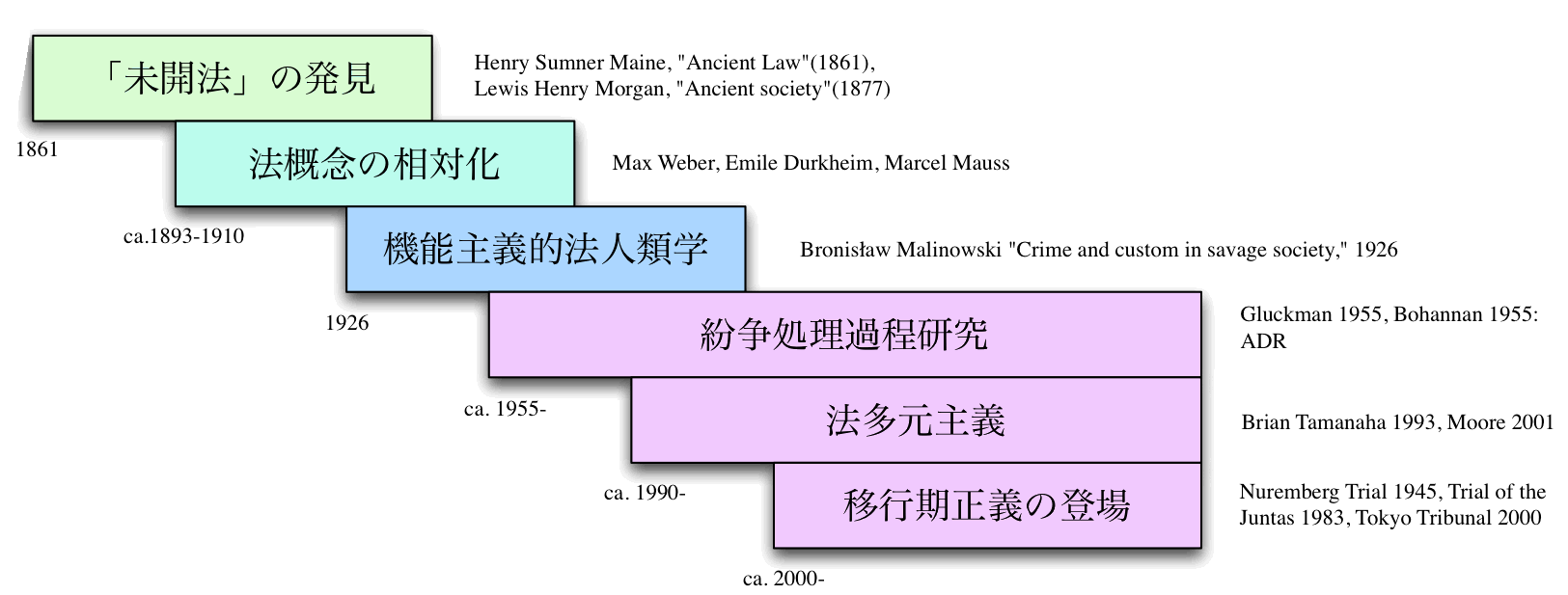
法人類学の4つのエポック
The Four Epochs of Legal Anthropology
☆ ︎法人類学:仮想シラバス▶︎法の人類学入門▶︎︎法人類学学習年表▶︎司法人類学▶法人類学基本文献集︎︎▶︎応用_法人類学▶千葉正士(法人類学者)文献集︎︎▶法人類学入門︎▶法カルチュラルスタディーズ︎︎▶︎修復的司法 (修復的正義)過程を学ぶ▶法・感情・ローカルノレッジ︎︎▶トランスナショナリティ研究の「フィールド」︎▶︎︎人類学ビジュアルガイドブック▶︎▶︎︎▶︎▶︎︎▶︎▶︎︎▶︎▶︎
| 法人類学の4つのエポック 法の人類学(anthropology of law, law anthropology)は法人類学(legal anthropology)とも言います。法の人類学は、文化人類学の下位分野で「社会秩序の通文化的研究」であるということができます。その理由は、法 または法律は、社会の秩序を「維持・進展」させるもので、行為に関する言語(→言語行為論)活動から構成されるもので、そのような言語活動は、外部からの 強制力[時に内面から規定することもある]すなわち「司法的権力(legal power)」によって支えられているからです。 さらに、法的権力(legal power)に、社会的正当性を与えるのは、その社会の成員が、法に従うことが「善いこと/良いこと」という判断、つまり倫理や道徳に支えられていること が必要になります。倫理や道徳に支えられて、人が動員(=動かされて行為すること)されることを、ヘゲモニー権力が作働していると表現することがありま す。法が整備する社会的装置がなければ、〈外部からの強制力=抑圧的権力(oppressive power)〉——具体的には警察や裁判所が使う権力や物理的力(=暴力)——を発動することができないからです。ヘゲモニーとは、人々による合意にもと づいた覇権や支配権のことをさします(→政治人類学)。 このように考えると、どのような社会でも、〈法的秩序についての共通の考え方〉があり「法的権力を作働させる装置」としての〈司法 (judicature, administration of justice)〉があると主張するのが、法の人類学ないしは法人類学の基本的な考え方です。 法の人類学ないしは法人類学についての、これまでの古典的な理論は、法を、法理論(=法学, jurisprudence)の観点から考察・分析する立場です。この立場は、法理論の人類学的考察(anthropology of jurisprudence)で、この立場は、法律学の下位分野である法社会学(sociology of law)——近代社会における実定法や法制度を専ら研究する分野——の通文化研究に近いものがあります。この学問は、長い間、比較法学の伝統の中に位置づ けられてきましたが、〈法のグローバリゼーション現象〉のもとで、非西洋の第三世界の法概念や、宗教と法の一致がつよくみられるイスラム法などの研究を通 して、見直しの機運があり、さまざまな比較法に関する事実の蓄積があります。 他方、法に関する現場での運用に関する文化人類学研究では、民族誌学にもとづく研究法とその分析が行われてきており、こちらは、クリフォード・ギアーツの 「ローカルノレッジ(現場での知/局所的な知の適用)」の提唱により、法の人類学的研究に新たな光が投げ掛けられています。 民族誌学よる通文化研究法にもとづく、法人類学の古典は、ブロニスラウ・マリノフスキーという人類学者がトロブリアンド諸島の住民について書いた『未開 (=野蛮な)社会における犯罪と慣習』(1926)にはじまります。 また、1933年には、ラドクリフ=ブラウンは『社会科学百科事典』にて「未開法」という項目——彼流の機能論的見解に充ち満ちていますが——を寄稿して います(ラドクリフ=ブラウン 1975:292-302)。 しかし、比較法的発想の始祖は、フランス啓蒙期の思想家のモンテスキューにあらわれます。しかし比較法研究における未開社会(当時「野蛮」な社会と言われ ており同義)と古代社会の法を、類似の適用形態だと考えた「進化主義的人類学」の成果とその古典としてあげられるものが、英国の法学者のヘンリー・メイン 卿(Sir Henry Maine)の『古代法(英語)』(1861)があげられます。ヘンリー・メインの業績で重要なことは、伝統社会と近代社会を峻別するのに、前者(=伝統 社会)は身分にもとづき、後者(=近代社会)は契約にもとづく、社会的紐帯(=今日の社会関係資本)が、どのような指標(=規準的な判別)にもとづいて、 対比されるのかについて指摘したことである。メインの議論を敷延すれば、伝統的な社会の法は、身分的秩序維持に注意が払われ、近代的なほうは(市民の間の 自由意思による)契約を維持することに重点がおかれていることが、容易に推測することができる。 |
The Four Epochs of Legal
Anthropology The anthropology of law, or law anthropology, is also referred to as legal anthropology. The anthropology of law is a sub-field of cultural anthropology, and can be described as “the cross-cultural study of social order”. The reason for this is that law or legislation is something that “maintains and advances” social order, and is composed of linguistic (→speech act theory) activities related to action, and such linguistic activities are supported by external coercive force [or sometimes internal regulation], that is, “judicial power (legal power)”. Furthermore, in order for legal power to be given social legitimacy, it is necessary that the members of that society judge that obeying the law is “good/right”, in other words, that it is supported by ethics and morality. It is sometimes said that the mobilization (i.e. being moved to act) of people supported by ethics and morality is the work of hegemonic power. This is because without the social apparatus provided by the law, it would not be possible to invoke [external] coercive power = oppressive power (i.e. the power and physical force [i.e. violence] used by the police and courts). Hegemony refers to hegemony or control based on the agreement of the people (see Political Anthropology). In this way, the basic idea of legal anthropology or corporate anthropology is to assert that every society has a “common understanding of legal order” and a “judicial system (administration of justice) that puts legal power into action”. The classical theory of legal anthropology or corporate anthropology is a position that examines and analyzes law from the perspective of legal theory (jurisprudence). This approach is similar to the cross-cultural studies of sociology of law, which is a sub-field of jurisprudence that exclusively studies positive law and legal systems in modern society. This field of study has long been positioned within the tradition of comparative law, but under the phenomenon of “legal globalization,” there is a momentum for re-evaluation through the study of non-Western third world legal concepts and Islamic law, which strongly reflects the unity of religion and law, and there is a wealth of accumulated facts on various comparative laws. On the other hand, in the field of cultural anthropological research on the practical application of law in the field, research methods based on ethnography and analysis have been conducted, and this has shed new light on anthropological research on law through Clifford Geertz's advocacy of “local knowledge (knowledge in the field/application of local knowledge)”. The classic work of legal anthropology based on ethnographic cross-cultural research methods began with Bronislaw Malinowski's 1926 book, “Crime and Custom in a Savage Society”, which he wrote about the inhabitants of the Trobriand Islands. In 1933, Radcliffe-Brown also contributed an article entitled “Law of the Savages” to the Encyclopaedia of the Social Sciences (Radcliffe-Brown 1975: 292-302), which is full of his functionalist views. However, the founder of the comparative law approach can be found in the French Enlightenment thinker Montesquieu. However, the results of “evolutionary anthropology”, which considered the laws of primitive societies (which were referred to as “savage” societies at the time and were synonymous) and ancient societies in comparative law studies to be similar forms of application, and the classic work that is cited as such is “Ancient Law” (1861) by English jurist Sir Henry Maine. What is important about Henry Maine's work is that he pointed out how the social ties (i.e. social relationship capital today) of traditional societies and modern societies, which are based on status and contracts respectively, are contrasted based on what criteria (i.e. normative distinctions). Extending Maine's argument, it can be easily inferred that the law of traditional societies pays attention to maintaining a system of social status, while modern societies (among citizens) place more emphasis on maintaining contracts (based on free will). |
リ ンク
文 献
そ の他の情報
Copyleft, CC, Mitzub'ixi Quq Chi'j, 1996-2099
☆
 ☆
☆